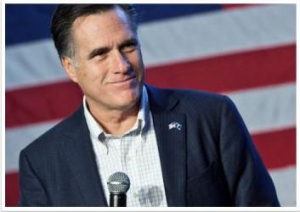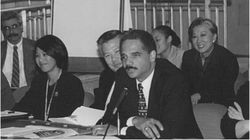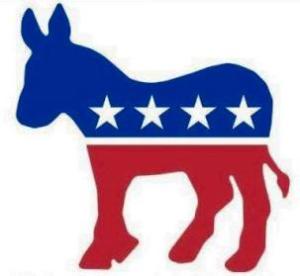What role will marijuana play in the presidential election campaign? Look to Colorado.
A US 6th Circuit Court of Appeals decision saying police do not need a warrant to track people through their cell phones has broad implications. The ACLU is on the case.
StoptheDrugWar.org is pleased to announce our first teleconference, this one featuring representatives of the three state campaigns to legalize and regulate marijuana this November, and other exciting speakers.
The Colorado marijuana legalization initiatives continues to hold a nine-point lead in polls, but hasn't yet broken 50%.
Six weeks out from election day, the Washington marijuana legalization initiative is showing the best polling numbers yet.
Now, here's a shocker: All the former heads of the DEA want Attorney General Holder to speak out against the marijuana legalization initiatives.
Is the world's longest-running insurgency coming to an end? The Colombian government and the leftist guerrillas of the FARC have announced their first peace talks in a decade, but that's just the first step.
Drug reformers won't find the Democratic platform's positions on drug policy very inspiring.
No DEA raids or federal threat letters to report this week, but the battles over medical marijuana continue on many fronts.
An Alabama man faced with deputies coming to take him in on drug charges shot himself instead last Sunday night. That's the 47th drug war death of the year.
A Louisiana cop gets strung out in a hurry, a Florida cop is has car problems, a Kentucky state trooper has perv problems, and one member of a rogue New Jersey drug squad heads to prison.
As the 2012 election campaign enters its final weeks, all eyes are turning to the top of the ticket. While, according to the latest polls and electoral college projections, President Obama appears well-positioned to win reelection, the race is by no means a done deal, and there's a chance that marijuana policy could play a role -- especially in one key swing state, Colorado, where the Campaign to Regulate Marijuana Like Alcohol is running a popular and well-funded campaign to pass Amendment 64.

President Obama (wikimedia.org)
But other than that, marijuana policy in particular and drug policy in general do not appear likely to be big issues, at least between Obama and his Republican challenger Mitt Romney. That's because both candidates hold similar positions:
Both oppose marijuana legalization, which will also be on the ballot in Oregon, and Washington. Obama, while at least paying lip service to patient access to medical marijuana, which will be on the ballot in Arkansas, Massachusetts, and Montana, has presided over a Justice Department crackdown on medical marijuana distribution, while
Romney appears irritated and uncomfortable even discussing the issue.
"With Obama, we've all been disappointed with the backtracking, although he also needs credit for the original Ogden memo and opening the gates to a wider proliferation of medical marijuana around the country," said Drug Policy Action head Ethan
Nadelmann. "For the people most disappointed with that, the paradox is that Romney offers very little of promise."
That was illustrated by GOP vice-presidential nominee Paul Ryan's brief flirtation with medical marijuana. Last Friday,
Ryan said medical marijuana was a states' rights issue. The comments came in Colorado, where the issue is hot.
"My personal positions on this issue have been let the states decide what to do with these things," he said in an interview with a local TV reporter. "This is something that is not a high priority of ours as to whether or not we go down the road on this issue. What I've always believed is the states should decide
. I personally don't agree with it, but this is something Coloradans have to decide for themselves."
But Ryan, who has a previous voting record opposing states rights to medical marijuana, did half a backtrack the next day, when one of his spokesmen explained that Ryan "agrees with Mitt Romney that marijuana should never be legalized."
Obama as president has supported increased drug war funding to Mexico and Central America, and Romney as candidate supports it as well. But his views are malleable. When running for the nomination in 2008,
Romney suggested that spending on interdiction was a waste, and the money would be better spent on prevention here at home. Again, that is not so different from the Obama position which, rhetorically if not budgetarily, emphasizes treatment and prevention over interdiction and law enforcement.
The relative quiet around drug policy in the two campaigns is reflected in the
Democratic platform and the
Republican platform. There are only a handful of mentions of drugs or drug policy in the Democratic platform -- and the word "marijuana" doesn't appear at all -- all of them having to do with either combating international organized crime or touting the Obama administration's baby steps toward a slightly more progressive drug policy.
One of those progressive measures was overturning the federal ban on needle exchange funding, but the platform makes no mention or that or of the words "harm reduction." It does urge "supporting local prison-to-work programs and other initiatives to reduce recidivism, making citizens safer and saving the taxpayers money" and says the Democrats "will continue to fight inequalities in our criminal justice system," pointing to the passage of the Fair Sentencing Act as "reducing racial disparities in sentencing for drug crimes." The act actually addresses only crack cocaine sentencing.
While emphasizing their tough on crime positions, the Republican platform also takes some baby steps toward a more progressive drug policy. It calls for rehabilitation of prisoners and for drug courts, supporting state efforts to divert drug offenders to treatment, and it criticizes the federalization of criminal offenses. But the single most dramatic change in the Republican platform is that has eliminated what was in previous platforms an entire section on the war on drugs.
Just as with the candidates, the platforms give drug policy little time or space. In an election driven by the economy and the fires burning in the Middle East, the issue is going to get short shrift, especially when there is little daylight between the candidates on the platforms on the issue.
There are alternatives to the bipartisan drug policy consensus, but they remain on the margins. At least three third party candidates,
Rocky Anderson of the Justice Party, Libertarian Party nominee
Gary Johnson, and Green Party nominee
Jill Stein, are calling for an end to the drug war and marijuana legalization, but they are all but shut out of presidential debates and media interest.

Mitt Romney (mittromney.com)
Since there is little substantive difference in the drug policy positions of the two front-runners and since their positions on marijuana legalization put them at odds with half the country -- 50% now support legalization, according to the most recent Gallup poll -- neither candidate has much incentive to open his mouth on the issue. And they may be able to get away with it.
"Can the campaigns get away with not talking about marijuana?" Drug Policy Action head Ethan Nadelmann asked rhetorically. "That depends. First, will the question get popped at one of the debates? I don't know how to influence that. The second possibility will be if the candidates are obliged to answer a question somewhere, but I don't know how much they're taking questions -- their handlers are trying to keep them on message. The third possibility is that they will say something at private events, but who knows what gets said there?" he mused.
"They are certainly going to try not to talk about it," said Morgan Fox, communications director for the
Marijuana Policy Project. "Given Romney's anger at a reporter for bringing up the issue and Obama's reluctance to address questions about marijuana policy in public forums, one can expect them to continue this behavior until forced to answer questions by the media or the public."
That leaves voters for whom marijuana reform is an important issue hanging out to dry.
"Unless one of the candidates sees an opportunity for a large boost in support by changing his position on marijuana policy, voters will be forced to choose between either third party candidates or the major party option that they think will do the least amount of damage to reform efforts going forward," said Fox. "If we consider Obama's behavior so far and Romney's staunch anti-marijuana statements (as well as the fact that he has never used it) it becomes a really difficult choice for voters."
Nadelmann begged to differ on that point.
"Romney has been more hostile on this issue than McCain or Bush or any Democratic candidates since Bush the Elder," he said. "He is visibly uncomfortable and even hostile regarding even the most modest drug policy reforms. Romney said if you want to legalize marijuana, you should vote for the other guy. That's very telling, with over 50% of independents and even more than 30% of Republicans supporting marijuana legalization. Why would Romney say that? The Obama campaign would have a hard time running with this, but someone else could."
Still, the lack of space between the major party candidates on the issue may leave an opening for Anderson or Johnson or Stein, Fox said.
"These candidates are the only ones offering real solutions to the quagmire of marijuana prohibition, or even taking definitive stances on the issue. The more they continue to draw public attention to marijuana reform while the major players stay silent, the more we can expect voters to pay attention to them and take them seriously," he predicted. "We can also expect their vocal support for reform to draw the attention of the major candidates and possibly elicit some sort of positive response from one or both of them. Whether that response will be sincere or simply lip-service to prevent third-party candidates from siphoning votes in key elections remains to be seen. However, even the latter would be a sign that the message is getting out and that politicians are at least starting to realize where the public stands on marijuana."
The one place where marijuana policy discussion may be unavoidable and where marijuana policy positions could influence the statewide electoral outcome is Colorado. Marijuana is a big issue in the state, not only because Amendment 64 is on the ballot, but also because of the ongoing war of attrition waged against dispensaries there by the DEA and the US Attorney. (The
Colorado Patient Voters Project tracks federal activity against medical marijuana in the state, as does our own
Medical Marijuana Update series, accessible with other relevant reporting in our
medical marijuana archive section.)

Gary Johnson (garyjohnson2012.com)
And it's a tight race where one third party candidate in particular, Gary Johnson, is making a strong run and exploiting his popular legalization position on marijuana. While the
Real Clear Politics average of Colorado polls has Obama up 48.7% to Romney's 45.3%, the race tightens up when Johnson is included in the polls.
"I think Colorado is key," said Nadelmann. "It has the initiative and it's a swing state, and there is the possibility that Gary Johnson or the Green candidate could make a difference. The polling has been split, and the question with Gary Johnson is whether he draws more from Obama or Romney."
One recent poll may hold a clue. Among the polls included in the Real Clear Politics average is a new
Public Policy Polling survey, which had Obama beating Romney 49% to 46%. But when the pollsters added Johnson to the mix, he got 5%, taking three points away from Obama, but only two from Romney, and leaving Obama with only a two-point lead, 46% to 44%.
This year's election results from Colorado could mark a historic point for the marijuana reform movement, and not just because of Amendment 64, said Fox.
"This is a state where we are really going to see the power of this issue as it relates to elections," he said. "This is possibly the first time that marijuana policy could affect the outcome of a presidential election. That just goes to show how far reformers have come in just a few short years. As public opinion in support of ending prohibition continues to grow, the paradigm is going to shift from politicians avoiding the issue at all cost or being knee-jerk reactionaries who want to appear 'tough on crime' to candidates addressing marijuana policy in a rational manner as a way to build support."
We'll see in a few weeks how this all shakes out, but before then, we'll be taking an in-depth look at pot politics in Colorado in the context of Amendment 64. Stay tuned.
Please read our last week's feature, overviewing the various state ballot initiatives: Drug Policy in the 2012 Elections I: The Initiatives.
(This article was published by StoptheDrugWar.org's lobbying arm, the Drug Reform Coordination Network, which also shares the cost of maintaining this web site. DRCNet Foundation takes no positions on candidates for public office, in compliance with section 501(c)(3) of the Internal Revenue Code, and does not pay for reporting that could be interpreted or misinterpreted as doing so.)back to top
special to Drug War Chronicle by investigative journalist Clarence Walker, [email protected]
The American Civil Liberties is challenging a federal appeals court ruling that it is legal for the DEA and other law enforcement agencies to track GPS-equipped cell phones without a warrant. The group has filed an amicus brief urging the full 6th US Circuit Court of Appeals to reconsider the ruling of a three-judge panel last month in US v. Skinner, with ACLU attorney Catherine Crump warning that "the Sixth Circuit ruling in August in Melvin Skinner's case undermined the privacy rights of everyone who carries a cell phone."

Melvin Skinner was suspected of being part of a massive marijuana trafficking organization. Without getting a warrant or showing probable cause, the DEA forced Skinner's cell phone company to provide them with his GPS coordinates continuously as they tracked him cross-country for three days. Using that data, they tracked him down in Texas, searched his mobile home, found 1,100 pounds of marijuana, and arrested him on drug charges. Skinner was convicted and then appealed, arguing that the GPS tracking of his cell phone without a warrant violated his Fourth Amendment rights.
"There is no Fourth Amendment violation because Skinner did not have a reasonable expectation of privacy in the data given off by his 'pay-as-you-go' cell phone, the kind of phone called 'burners' that drug dealers often use for business and quickly dispose of," Judge John Rogers wrote in the majority opinion in Skinner. "If a tool is used to transport contraband and it gives off a signal that can be tracked, certainly the police can track the signal."
A well-known tool of the trade for those in the drug underworld, 'burners' were also popularized by the HBO show
The Wire, which hyped the notoriety of the prepaid phones in its series.
Legal experts say if the Sixth Circuit decision stands it would severely undercut the US Supreme Court decision this past January in the case of accused drug dealer Antoine Jones. In
US v. Jones, the Supreme Court issued a historic decision prohibiting law enforcement from tracking vehicles with GPS device without first obtaining a search warrant -- a tactic the feds used against Jones case when the FBI and DEA installed a GPS device on his SUV for 28 days.
Jones' life sentence without parole was reversed and he was remanded for retrial scheduled in 2013. The chilling effect of the Supreme Court ruling in the Jones case forced the FBI to pull the plug on 3,000 GPS tracking systems that had been secretly installed on vehicles across the nation.
"While the Jones case imposes constitutional restrictions on law enforcement to track vehicles with warrantless GPS devices, the Sixth Circuit has now held that agents can engage in even more intrusive surveillance of cell phones without implicating the Fourth Amendment at all," the ACLU noted in its brief to the court.
In their efforts to overturn Skinner's lengthy prison sentence, his attorneys argued that the use of the GPS location information in the cell phone that led to his arrest violated the Fourth Amendment prohibition against warrantless searches and seizures. The primary question in the case was whether Skinner had a "reasonable expectation" of privacy in the data that his cell phone emitted.
The Sixth Circuit ruling comes exactly a month after a Congressional inquiry discovered how law enforcement made over 1.3 million requests for cell phone data last year, seeking subscriber information, text messages, location data and calling records. If upheld, it would be a major boost for government surveillance power as state and federal prosecutors shift their focus to warrantless cell-towers to ferret out cell phone data and track the GPS signals in cell phones without a warrant in a bid to get out from under the Supreme Court's ruling in that police cannot use warrantless GPS to track vehicles.
Lawyers and law enforcement officials agree there are too many conflicts over what information the police are entitled to legally get from wireless cell carriers.
"It's terribly confusing, and understandably so, when federal courts can't agree," cell phone industry attorney Michael
Sussman told the
New York Times earlier this year. The companies "push back" often when confronted with "urgent" requests for cell phone data, he said. "Not every emergency is an emergency."

US 6th Circuit Court of Appeals Judge John Rogers (wikimedia.org)
Without a doubt, cell phone data and GPS signals in cell phones are hot commodities in the surveillance business. Business is booming for wireless carriers who sell customers data and cell phone locations to police either by the hour or for one big fee.(See our May story on the practice and the legal challenges to it
here.)
But law enforcement is especially well-placed to take advantage of the data. With a simple judge's order, it can easily obtain reams of data and the GPS location of a target's cell phone without a warrant.
As the Times noted, tracking GPS signals in cell phones has become such a tempting technique that the Iowa City Police Department had to issue a stern warning to officers: "Do not mention to the public or the media about the use of cell technology or equipment used to locate targeted subjects and its use should be kept out of police reports."
Similarly, a 2010 training manual written by California prosecutors informed investigators on "how to get the good stuff" using technology. Another police training manual describes cell phones as "the virtual biographer of our daily activities," providing a hunting ground for learning contacts and travels.
The easy availability of cell phone data could spell big trouble for accused drug dealer Antoine Jones as he prepares for retrial next year. This time around, the feds will not use GPS evidence from his vehicle because the Supreme Court prohibited that in his case last year, but it plans to use Jones' cell phone data and the GPS signal in his phone as evidence to connect him with numerous kilos of cocaine.
On September 4, the Obama administration, citing a 1976 Supreme Court precedent, told the federal judge in Jones case that such data, like banking records, and cell phone records, are "third-party records," which means customers have no right to keep it private.
Jones' attorney, Eduardo
Balarezo, disagreed. "The government seeks to do with cell site data what it cannot do with the suppressed GPS data that's already been ruled illegal by the Supreme Court," he argued in his brief in the case.
Jones, who is still behind bars despite his victory at the Supreme Court because the government insists on retrying him, is steadfast.
"I am going to fight this all the way to the end," he told the Chronicle.
Aside from the Fourth Amendment implications of the Skinner decision, the case raises another question: Did the courts misinterpret the arcane federal laws governing electronic surveillance?

Jennifer Granick, director for civil liberties, the Stanford Law School Center for the Internet and Society
A Stanford University attorney who is an expert on the legalities now says even the trial court erroneously applied the wrong "trap and trace" statute in denying to suppress the evidence the DEA used to obtain a court order to track the GPS signal in Skinner's phone.
"It was basically the government's "hybrid theory" of what constituted a legal trace of the phone and the court
intrepreted the wrong statute," Jennifer
Granick told the Chronicle. "The tracking order the DEA used to track Mr. Skinner's phone was not applied correctly under the statute. Pinging a phone in real time is governed by the Pen Register/Trap and Trace statute. To get a trap and trace order, the government usually needs an order under [the relevant] section."
But as
Granick has argued in
federal criminal defense seminars, the Communications Assistance for Enforcement Act (
CALEA) prohibits use of the pen register authorization to obtain subscriber location information."So, the feds should have gotten a warrant under [a different] rule for this information, but clearly did not,"
Granick concluded.
The confusion is around whether to apply the Pen Register statute or the Stored Communications Act (
SCA). The
SCA was used by the judge to authorize the trace on Skinner's phone. Under
SCA, police cannot receive the contents of the electronic communication, but, police are allowed to find out "where whom said what."
The advantage for law enforcement, prosecutors and judges in such matters is the fact they often use this reasoning to obtain location data that can easily turn a cell phone into a tracking device without a warrant -- whereas legal experts say it should require a much higher threshold -- like a probable cause warrant.
Granick was surprised to learn the court relied on the
SCA instead of the other relevant laws.
"You mean the court authorized real time tracking based on the Stored Communications Act, without even a reference to the Pen Register statute or
CALEA?" she asked incredulously. "Well, it's not right, but that's what the court did."
Restrained by the Supreme Court from using warrantless GPS tracking by the Jones case, federal law enforcement and local police are making greater use of cell phone data to track suspects. Whether that is constitutional is still an open question. Federal courts are splitting on the issue of whether the collection of cell phone data and the warrantless tracking information of the GPS signal in a phone is legal. That means the issue is likely headed for the Supreme Court for final resolution.
Meanwhile, it looks like Skinner may have yet another issue to raise on appeal.
back to top
StoptheDrugWar.org is pleased to announce our first teleconference, featuring the initiative campaigns in Colorado, Oregon, and Washington State to enact regulatory (legalization) systems for marijuana. Please join us by phone or Skype on Thursday, September 27, 6:
00pm PST / 9:
00pm EST -- call (805) 399-1200 and enter access code 135516. We will discuss what the initiatives do, what their prospects are for passage and for fueling further reform, and what people can do to get involved.
The following exciting speakers have agreed to join us:
- Oscar Eason, Jr., NAACP Alaska/Oregon/Washington State Area Conference
- Alison Holcomb, New Approach Washington
- Paul Stanford, Oregon Cannabis Tax Act
- Brian Vicente, Sensible Colorado
Please RVSP here on our Facebook event page or our evite, and please spread the word! We will accept questions by email, now and during the teleconference -- send them to [email protected].
Please stay tuned also for announcements of additional teleconferences to discuss the upcoming state medical marijuana initiatives, prospects for reform in Congress next year, and other topics. If you are not already subscribed to the Drug War Chronicle newsletter, you can subscribe here -- follow us on Facebook and Twitter too.
back to top
Two months out from election day, positions appear to be hardening in the battle over legalizing marijuana in Colorado. A new Public Policy Polling survey shows Amendment 64, which would legalize and regulate marijuana like alcohol, maintaining the same nine-point lead it held last month.

Amendment 64 ad aims to reassure parents about teen marijuana use.
According to the poll results, both support -- at 47% -- and opposition -- at 38% -- remain unchanged. That's both good and not so good news for the legalization campaign. The good news is that the initiative remains ahead; the not so good news is that it isn't above 50%. But undecided voters would have to break 4-1 against the initiative for it to fail, if all of them vote yes or now and if the PPP numbers hold up.
PPP noted that the ballot language could be somewhat confusing, so it also asked a general question about marijuana legalization. That polled slightly higher, with 49% saying they approved and 43% saying they didn't.
That 43% who oppose marijuana legalization in general will likely represent the minimum "no" vote in November. Now, the initiative campaign must maintain the support it currently has while picking up some of those 15% of the voters who are undecided.
back to top
A solid majority of Washington voters approve of Initiative 502, the marijuana legalization measure sponsored by New Approach Washington, according to a SurveyUSA poll released this week. The poll had support for the initiative at 57%, with 34% opposed.
The initiative would legalize and regulate the cultivation, distribution, and possession of marijuana by adults 21 and over. Similar measures are on the ballot in Colorado and Oregon.
The level of support for the initiative is higher than a Public Policy Polling survey in June, which had support at 54% and opposition at 37%.
Campaign organizers can take some comfort in the numbers, which show an absolute majority in favor of the initiative. It's one thing to be leading in a poll, but unable to crack the 50% mark; it's another to go comfortably over 50%. If the campaign can keep its numbers from slipping in the final weeks, it appears poised for victory.
The poll's cross-tabs show almost identical levels of support among men (58%) and women (57%), while every age group except the 65-and-older (45%) also shows majority support. The initiative polled strongly with whites (60%), but not so much with Hispanics (47%) or Asians (42%). Whites make up 80% of the Washington electorate.
Democrats (70%) and independents (62%) strongly support the measure, while only one-third (33%) of Republicans do. Similarly, the measure wins majority support among liberals (76%) moderates (63%), and Tea Party members (!) (54%), but not among conservatives (33%).
SurveyUSA contacted 700 Washington residents last week and identified 524 of them as likely voters. The poll was conducted by telephone, using both cell phones and land lines.
Just a little more than a month and a half from election day, Initiative 502 is sitting pretty. It also has a lot of money in the bank and little sign of organized opposition. It could happen this year in Washington state.
back to top
Every former head of the DEA since it was created by Richard Nixon in 1973 has signed onto a letter to Attorney General Eric Holder urging him to speak out against the marijuana legalization initiatives on the ballot in three Western states. The former top narcs warned that silence would be seen as acquiescence.

Eric Holder
"We urge you to oppose publicly
Amendment 64 in Colorado,
Initiative 502 in Washington, and
Measure 80 in Oregon," the former DEA chiefs wrote. "To continue to remain silent conveys to the American public and the global community a tacit acceptance of these dangerous initiatives."
Legalization at the state level would be a "direct violation of the Controlled Substance Act," they wrote. "Since these initiatives would 'tax and regulate' marijuana, there is a clear and direct conflict with federal law."
The former top narcs said they were "encouraged" by Holder's having spoken out against California's 2010 Proposition 19 and by President Obama's strong stance against legalization. They urged Holder to take a public position against the initiatives "as soon as possible."
Reuters reported that Holder's office had no comment on the letter, but former
ONDCP official Kevin
Sabet told the news agency he wouldn't be surprised if Holder again spoke out against legalization.
"Essentially, a state vote in favor of legalization is a moot point since federal laws would be, in (Holder's) own words (from 2010), 'vigorously enforced,'"
Sabet said. "I can't imagine a scenario where the Feds would sit back and do nothing."
But marijuana legalization backers described themselves as unsurprised by the letter and were quick to strike back.
"Anyone who is objective at all knows that current marijuana policy in this country is a complete disaster, with massive arrests, wasted resources, and violence in the US and especially in Mexico," said Jill Harris, managing director of strategic initiatives for Drug Policy Action, the lobbying arm of the
Drug Policy Alliance.
Similarly, Mason
Tvert, co-director of the Colorado
Campaign to Regulate Marijuana Like Alcohol, told
The Huffington Post Monday that he expected no less from the former top narcs, but that Holder and the Obama administration would be wise to reject their call.
"It is not surprising that these men, who have made a living off of marijuana prohibition, want their successors to continue profiting from the existence of the underground marijuana market,"
Tvert wrote. "They just want to keep billions of taxpayer dollars flowing to their buddies. They know that marijuana prohibition isn't really improving public safety; just as our nation's streets weren't safer when Al Capone and his cohorts controlled the alcohol trade," he added.
"For Eric Holder to act as the mouthpiece for these old school warriors of the irrational war on marijuana that is rapidly losing public support would be sending a message to tens of thousands of passionate supporters of Amendment 64 that their opinions do not matter,"
Tvert warned the administration. "He will be telling them that Colorado must continue to live under a system of marijuana prohibition not because it makes sense, but because the federal government demands it. Most people accept the view that drug prohibition has been a colossal failure."
What will Holder do? Time will tell.
back to top
For the first time in nearly a decade, the Colombian government will sit down for peace talks with the Marxist guerrillas of the FARC, which has been fighting to create a socialist Colombia since 1964. President Juan Manuel Santos broke the news in a nationwide address last Tuesday night, and the FARC have confirmed that the talks are on.

President Santos addresses the nation on peace talks. (presidencia.gov.co)
He would seek "a definitive peace" with the rebels, he said. "Any responsible leader knows he can't let pass up a possibility like this to end the conflict. No doubt there are risks," said Santos. "But I believe history would be much more severe with us all if we did not seize the opportunity."
The announcement of peace talks does not mean an immediate end to the fighting, however, and that could prove problematic.
"Military operations will continue with the same or stepped-up intensity," Santos said, adding that the talks would not be open-ended. "They will be measured in months, not in years," he said. "If there are not advances, we simply won't continue."
"It's going to be so much harder to negotiate while people are being extorted and oil pipelines are being attacked, child soldiers are being recruited and land mines are being laid," Adam
Isaacson, a Colombia expert with the Washington Office on Latin America told the Associated Press.
The agreement was brokered with the assistance of Cuba and Norway, which will "facilitate" the coming peace talks. Chile and Venezuela will act as observers.
The last round of peace talks between the government and the
FARC went on fruitlessly for more than three years beginning in 1999 and ended when a frustrated President
Pastrana sent the Colombian military into the
FARC safe haven
Pastrana had ceded at the beginning of the talks.

FARC art (farc-ep.co)
Since then, the
FARC has suffered militarily as Colombia has put US assistance to the tune of $700 million a year to work. Its original leadership has been killed or died of old age, and the number of guerrillas has dropped from about 20,000 to about 8,000.
But the
FARC has also been killing Colombian soldiers at a higher rate than ever. It remains ensconced in its rural redoubts supported by a loyal peasantry, and continues to profit from the coca and cocaine trade.
The
FARC's role in the drug trade will be a complicating factor in the talks. The US is seeking five of the group's six secretariat members on drug trafficking charges.
The
FARC also seeks fundamental reforms in the Colombian state and economy, which is also likely to prove problematic. Although President Santos has signaled he is willing to discuss agrarian reform and rural development, he is likely to run into fervent opposition from wealthy rural interests who allied themselves with former President Alvaro
Uribe and rightist
paramilitaries during his term in office.
The
paramilitaries killed thousands and generated tens of thousands of internal refugees, trafficking themselves in cocaine the whole time, until they reached an agreement to demobilize under
Uribe.
Will the world's oldest insurgency be coming to an end soon? Stay tuned.
back to top
The Democrats are on their way home from the national convention in Charlotte, and now is a good time to examine their official stand on drug policy. A review of the 2012 Democratic National Platform suggests there's not much new there.
There are only a handful of mentions of drugs or drug policy in the text of the platform -- and the word "marijuana" doesn't appear at all -- all of them having to do with either combating international organized crime or touting the Obama administration's baby steps toward a progressive drug policy.
The first mention of drugs comes in the section about "Strengthening the American Community" and its subsection about Puerto Rico. It calls for more drug law enforcement there: "We support increased efforts by the federal government to improve public safety in Puerto Rico and the United States Virgin Islands, with a particular emphasis on efforts to combat drug trafficking and crime throughout our Caribbean border."
Similarly, in the platform's subsections on "Transnational Crime" and "The Americas," the mention of drugs and drug policy comes only in the context of fighting crime. The former section merely notes that "transnational criminal organizations have accumulated unprecedented wealth and power through the drug trade, arms smuggling, human trafficking, and other illicit activities" and touts the Obama administration's comprehensive Strategy to Combat Transnational Organized Crime.
In the latter section, there is more "tough on crime" talk: "We have strengthened cooperation with Mexico, Colombia, and throughout Central America to combat
narco-traffickers and criminal gangs that threaten their citizens and ours. We will also work to disrupt organized crime networks seeking to use the Caribbean to smuggle drugs into our country. As we collectively confront these challenges, we will continue to support the region’s security forces, border security, and police with the equipment, training, and technologies they need to keep their communities safe. We will improve coordination and share more information so that those who traffic in drugs and in human beings have fewer places to hide. And we will continue to put unprecedented pressure on cartel finances, including in the United States."
The only other mention of drugs or drug policy comes in the platform subsection on "Public Safety, Justice, and Crime Prevention." Here, even as they acknowledge that serious crime is at a 50-year low, the Democrats say they are "fighting for new funding that will help keep cops on the street" and "to ensure our courageous police officers and first responders are equipped with the best technology, equipment, and innovative strategies to prevent and fight crimes."
The platform also says that Democrats will "[continue] to invest in proven community-based law enforcement programs such as the Community Oriented Policing Services program" and "support local prison-to-work programs and other initiatives to reduce recidivism, making citizens safer and saving the taxpayers money."
The Democrats "will continue to fight inequalities in our criminal justice system," the platform says, pointing to the passage of the Fair Sentencing Act as "reducing racial disparities in sentencing for drug crimes." The act actually addresses only crack cocaine sentencing.
Finally, the platform calls for increased law enforcement cooperation: "We must help state, local, territorial, and tribal law enforcement work together to combat and prevent drug crime and drug and alcohol abuse, which are blights on our communities. We have increased funding for the Byrne Justice Assistance Grant Program over the last four years, and we will continue to expand the use of drug courts."
This is your Democratic platform on drugs.
For our take on the Republican platform, go
here.
back to top
No DEA raids or federal threat letters to report this week, but the battles over medical marijuana continue on many fronts. Let's get to it:
National
Last Friday,
GOP vice presidential candidate Paul Ryan said medical marijuana was a states' rights issue. The comments came in Colorado, where the feds have been targeting medical marijuana dispensaries and where legalization is on the ballot. "My personal positions on this issue have been let the states decide what to do with these things," he said in an interview with a local TV reporter. "This is something that is not a high priority of ours as to whether or not we go down the road on this issue. What I've always believed is the states should decide
. I personally don't agree with it, but this is something
Coloradans have to decide for themselves." But Ryan, who has a previous voting record opposing states rights to medical marijuana, did half a backtrack the next day, when one of his spokesmen explained that Ryan "agrees with Mitt Romney that marijuana should never be legalized."
California
As of last Tuesday,
there were 472 dispensaries in Los Angeles, according to UCLA
Luskin School of Public Affairs professor Bridget
Freisthler, who counted them. That's less than half the number suggested by anti-dispensary City Councilmember Jose
Huizar, and about equal to the number of bars in the city or about 20% of the outlets that sell alcohol.
Huizar's "gentle ban" on dispensaries has been blocked after advocates delivered petitions seeking a vote on the matter.
Last Tuesday,
a state appeals court upheld the Riverside County ban on dispensaries in unincorporated parts of the county. The
4th District Court of Appeals in Riverside affirmed the county's power to ban in a case involving the Nature's Relief Group outside Murrieta and the
MOSA Collective in Thousand Palms. Last November, the same appellate justices upheld the city of Riverside's blanket ban on cannabis dispensaries, bolstering the county's efforts to shutter more than 30 such storefront operations then in business.
Also last Tuesday,
the Collins Collective sued the LAPD over threats made by police officers as the collective was in the process of constructing a building to operate in. Their lawsuit claims police last month threatened "severe repercussions" if the collective opened, and that they said they would forcibly shut it down and arrest the members. The lawsuit says LAPD then returned and reiterated those threats. The collective is seeking a temporary restraining order, followed by a preliminary injunction and ultimately a permanent injunction that would prevent the city and its employees from enforcing the city's ban against the plaintiff and its qualified patient members and a declaration that the city's actions are unconstitutional under state law.
On Monday,
the Clovis city council introduced an ordinance to regulate indoor grows. The city already bans outdoor marijuana gardens, dispensaries and patient-to-patient sales. The city would ban all cultivation entirely if it could, said Mayor Jose Flores. Since it can't, it settled for restricting the growing of pot plants to a 32-square-foot indoor area that can't be seen from the outside. The ordinance gets a second and final vote next week.
Also on Monday,
the Palo Alto city council voted to take a stand against a dispensary initiative that would legalize and tax up to three dispensaries in the city. The unanimous vote came after the council worried that dispensaries "can lead to 'secondary effects' in our neighborhoods, such as illicit drug sales, loitering and even criminal activity."
On Wednesday,
San Jose city council members proposed an ordinance to target dispensaries that fail to pay city taxes. Council members Sam
Liccardo, Rose Herrera and
Pierluigi Oliverio cited "millions" in business taxes not being paid in the past year alone by marijuana clubs as required under the city's voter-approved Measure U. That measure allows the city to tax marijuana collectives up to 10% of their total sales, though the council later adjusted that to a maximum of 7%.
Colorado
As of last week,
Boulder's medical marijuana industry has shrunk dramatically from its high point in 2010. There were more than 200 medical marijuana businesses operating in the city then; now there are just 26 dispensaries and 32 grow operations in the city. Dispensary operators say the city's strict approach to regulation has pushed even "good" operators out of business.
Montana
As of August,
the number of medical marijuana card holders was on the rise again, for the first time since May 2011, in the wake of DEA raids across the state and an attack on medical marijuana by Republican state legislators. There are 8,849 card holders, up five people from the previous month. The number of Montana medical-marijuana cardholders peaked at 31,522 in May 2011.
Last Thursday,
medical marijuana lobbyist Tom Daubert avoided federal prison time when he was sentenced to five years probation for his role in operating medical marijuana businesses, including Montana Cannabis.
Daubert pleaded guilty in April to a charge of conspiracy to maintain drug-involved premises, which carries a maximum potential sentence of 20 years in prison. He formed Montana Cannabis with partners Richard
Flor, Chris Lindsey and Chris Williams.
Flor pleaded guilty in April to maintaining drug-involved premises and was sentenced to five years in prison, but he died in custody last month after being moved to Nevada from a private prison in Montana. Lindsey and Williams face trial later this year.
Daubert had headed Patients and Citizens United, which led the fight for the successful 2004 medical marijuana initiative.
On Tuesday,
the state Supreme Court overturned a temporary restraining order blocking enforcement of part of the legislature's extremely restrictive rewrite of the voter-approved medical marijuana law. There is no fundamental right for patients to use any drug, particularly one like medical marijuana that’s illegal under federal law, the court held in reversing a lower court decision. "In pursuing one's health, an individual has a fundamental right to obtain and reject medical treatment," Justice Michael Wheat wrote for the majority. "But, this right does not extend to give a patient a fundamental right to use any drug, regardless of its legality." Last year, medical marijuana supporters obtained enough signatures to place the 2011 law on the ballot as a referendum. Voters on Nov. 6 will decide whether to keep or reject the law.
North Dakota
Last Tuesday,
11 people were charged with faking medical marijuana petition signatures in a scheme that helped keep the initiative off the November ballot. The eleven, including eight University of North Dakota football players, were paid $9 an hour to gather signatures for two initiatives, but Attorney General Wayne
Stenehjem said that many of the petition signatures were copied from phone books or fabricated.
Oregon
On Tuesday,
police raided the 45th Parallel dispensary in Ontario. They alleged violations of the Oregon Medical Marijuana Act, but did not say what they seized, if anything. A local activist said police seized a small, legal, medical marijuana grow and that there was no usable marijuana on the premises. No arrests were made.
Washington
Last Wednesday,
Tacoma ordered three medical marijuana businesses to shut down immediately. The city Finance Department hand-delivered letters to Emerald
Pharms,
T-Town Alternative Medicine and The
Vape Bar, all in South Tacoma. More such letters could follow, a city spokesperson said. After nearly two years of deliberation and a long moratorium, the council decided last month to regulate medical marijuana under its nuisance code. Collective gardens, which are expressly permitted under state law, will be tolerated, but dispensaries will not.
Last Thursday,
King County sheriff's detectives raided an Issaquah collective and seized some of the 536 plants and 65 pounds of processed marijuana. They left 135 plants and 15 pounds of pot. It's unclear if deputies knew they were raiding a collective when they went in, but they said they found expired paperwork for the garden and a registered felon in possession of a handgun. No arrests were made, but detectives forwarded the case to the King County Prosecutor's Office for review.
On Monday,
Seattle proposed new rules for medical marijuana enterprises. While the city supports medical marijuana, the rules seek to limit "large-scale cannabis-related activity" in residential zones, tourism areas, and neighborhood commercial zones. In those areas, marijuana businesses would be limited to growing 45 plants and having six pounds of marijuana on hand.
back to top
A
Buhl, Alabama, man apparently shot and killed himself as members of the Tuscaloosa County Sheriff's Office went to serve a possession of a controlled substance warrant on the night of September 2. Randall Justin Roberts, 34, becomes
the 46th person to die in US domestic drug law enforcement operations so far this year.
Citing police sources, the
Alabama.com news portal reported that when deputies went to the front door, Roberts' father, Randall Floyd Roberts refused to let them enter even after they showed him their warrant. The elder Roberts was then arrested for obstruction and subsequently charged with resisting arrest when he struggled with officers.
Once in the house, deputies went to the bedroom where they believed Roberts was, but heard a single gunshot go off as they opened the bedroom door. The deputies retreated, removed his mother from the house, and then set up a perimeter around the house. More deputies responded to the call of shots fired, as did the sheriff's SWAT team, replete with "the department's Bear Cat (Armored Tactical Vehicle), Aviation Unit, K-9 and Paramedic."
The SWAT team gave itself a workout. It tried to contact Roberts using the public address system in the Bear Cat. It threw flash grenades and then tear gas grenades. It used a helicopter to provide cover while it "deployed assets." It used a telescopic TV camera to search rooms in the house. It used the drug dog to indicate that Roberts was in the rear bedroom -- the same one where the single shot came from.
After about two hours, SWAT team members entered the house and found Roberts dead in closet in the bedroom. A .22 revolver was found lying next to him.
It's not clear whether the warrant was a search warrant or an arrest warrant. Roberts had been
arrested August 13 on drug distribution charges.
back to top
A Louisiana cop gets strung out in a hurry, a Florida cop is has car problems, a Kentucky state trooper has perv problems, and one member of a rogue New Jersey drug squad heads to prison. Let's get to it:
In Monroe, Louisiana,
a Monroe police officer resigned August 29 after he tested positive for methamphetamine following a traffic incident. K-9 Officer Kenneth Johnson is currently under criminal investigation for allegedly stealing the drugs from another agency. He had access to them for the purpose of training his drug dog. Although the drugs are placed in sealed containers, Johnson claimed he got some on his finger, tasted it, then used it several times and became addicted. He could face charges of malfeasance in office, theft, and meth possession.
In Miami Beach,
a Miami Beach police officer was arrested last Wednesday on charges stemming from a drug trafficking case. Officer George Navarro
Jr. is charged with charged with two counts of false statement of financial condition and two counts each of obtaining a vehicle by trick and unlawful subleasing of a vehicle. He is accused of being a "straw purchaser" of vehicles associated with a ring that stole and dismantled cars. The drug trafficking connection was reported, but is not clear.
In London, Kentucky,
a former Kentucky State Police trooper was sentenced Tuesday to six years and two months in prison for trying to trade a woman drugs in exchange for sex. Michael Pennington went down in September 2011, when he went to the woman's residence on official duty and spotted pills. He confiscated the pills, then told her he would not arrest or charge her if she had sex with him. The next day, he showed up while off duty and offered her a
Lortab in exchange for sex, but the woman had already complained to the State Police, who were waiting there to arrest him. He pleaded guilty to two counts of drug trafficking and carrying a firearm while trafficking prescription narcotics.
In Camden, New Jersey,
a former Camden police officer was sentenced last Friday to 10 years in federal prison for his part in a rogue elite anti-drug police unit that routinely stole drugs and cash from dealers and users, planted drugs on suspects, and falsified police reports. Antonio Figueroa, 36, was convicted in December of three counts of conspiring to violate the civil rights of city residents. Three other squad members have pleaded guilty, while a fifth was tried with Figueroa, but found not guilty. The case has spawned dozens of lawsuits brought by defendants whose convictions were vacated or overturned after details of an FBI investigation into the corruption charges were made public and resulted in the Camden County Prosecutor's Office's deciding to vacate or dismiss charges against nearly 200 defendants, many of whom had been convicted or pleaded guilty. Some were serving jail terms.
back to top














